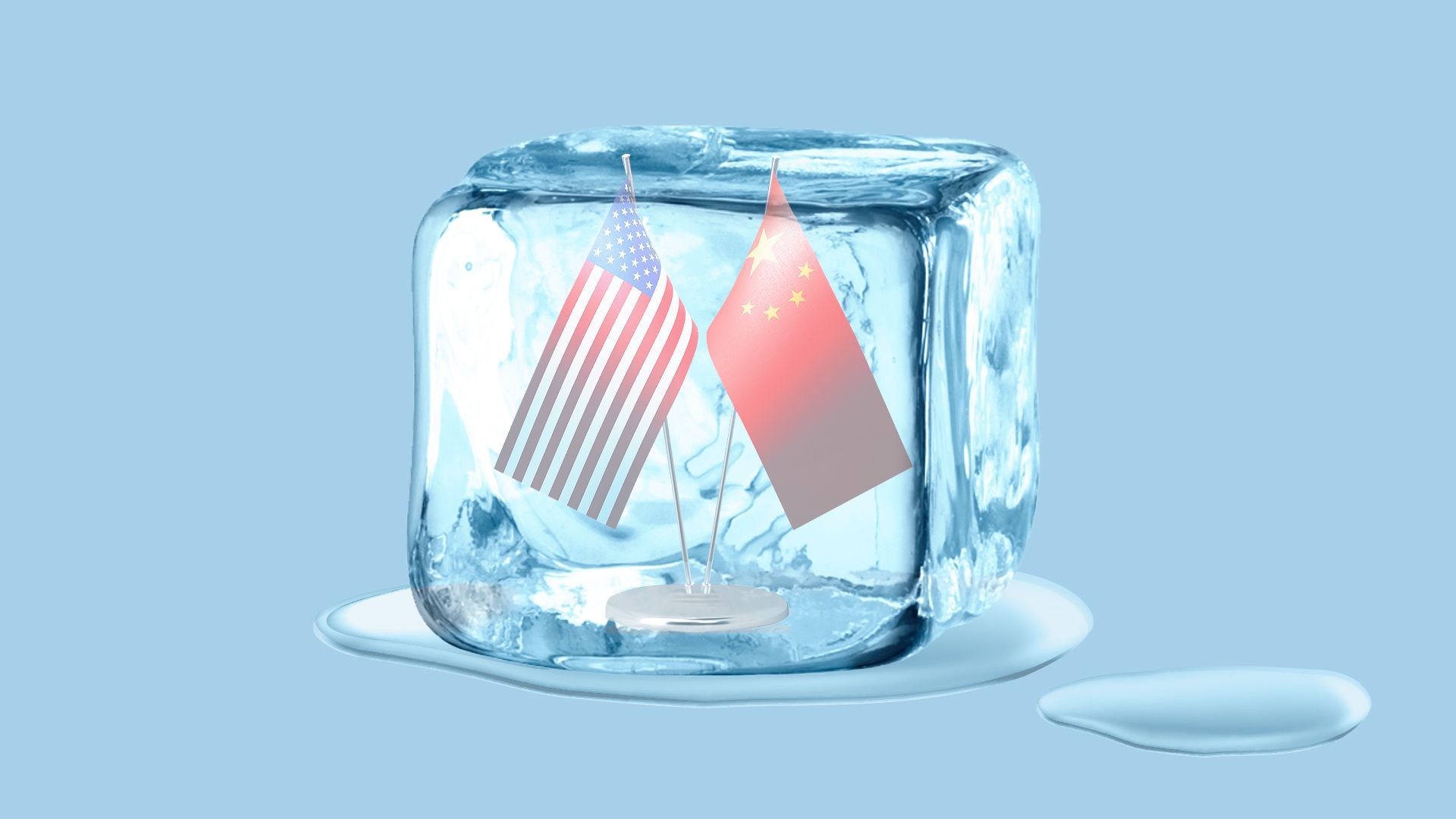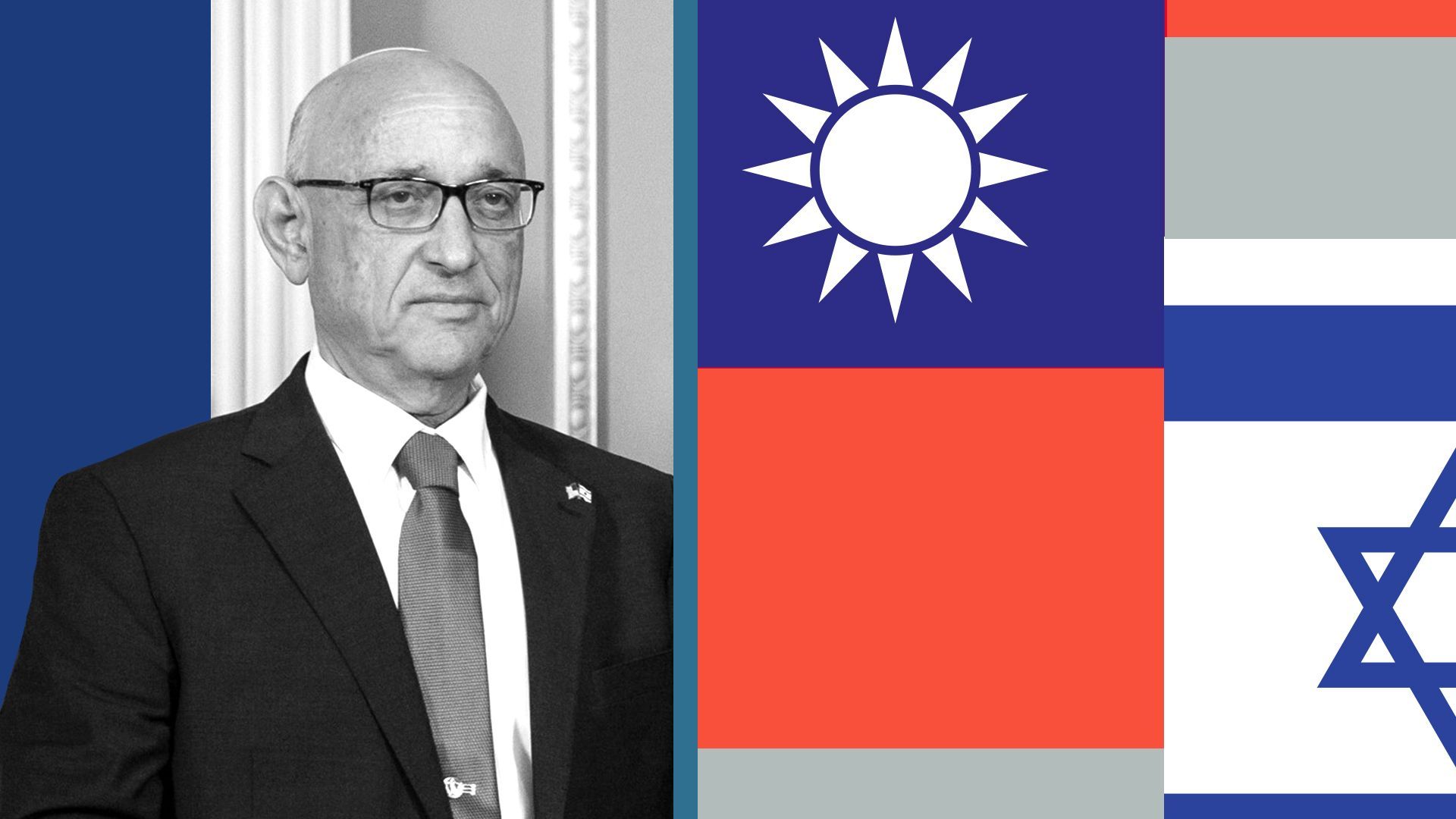| | | | | | | | | | | Axios China | | By Bethany Allen-Ebrahimian · Jun 20, 2023 | | Welcome back to Axios China. Today we're looking at takeaways from Blinken's trip to China, consumer boycotts of foreign brands, the Israel-Taiwan relationship, and lots more. - Send tips and feedback to bethany@axios.com, or just hit reply.
Today's newsletter is 1,674 words, a 6-minute read. | | | | | | 1 big thing: The U.S and Chinese militaries still aren't talking |  | | | Illustration: Aïda Amer/Axios | | | | U.S. Secretary of State Tony Blinken's trip to China restored high-level dialogue between Washington and Beijing, but failed to persuade China's leaders to reopen communications that could help avert a potential military crisis. Why it matters: The failure to establish a military-to-military crisis communications channel prolongs the risk of miscalculation and conflict in the region, experts say. State of play: The U.S. military regularly engages in lawful "freedom of navigation" operations through international waters, including the South China Sea and the Taiwan Strait, over which China claims sovereignty. - Though China's claims have no basis in international law, the Chinese government uses its military to pressure and sometimes harass other militaries operating in the region, occasionally leading to tense confrontations.
The latest: Recent close calls between U.S. and Chinese military vessels in the region show it is "absolutely vital that we have these kinds of communications military to military," Blinken said at a press conference on Monday in Beijing. - Restoring military contact remains a "work in progress," Blinken said later in an interview with CBS.
- China's military previously said U.S. military activity in the region is "deliberately provoking risk."
Between the lines: Beijing "is trying to get the U.S. to fundamentally change its military posture in the region, so it doesn't want to play into the U.S. attempts to set up safeguards for U.S. military activities in the region," Paul Haenle, director of Carnegie China and former China director on the U.S. National Security Council under Bush and Obama, told Axios. - Beijing is using the issue as a form of leverage but may face "harsh judgment" from the international community for refusing to establish a crisis hotline, Haenle said.
- "It's hard to defend a policy of not talking when tensions in the region between the U.S. and China are so high."
Background: The Chinese government cut off several lines of communication, including military-to-military, after then-House Speaker Nancy Pelosi's visit to Taiwan last summer, and the bilateral relationship has failed to recover since then. - Careful diplomacy throughout the fall resulted in a series of high-level meetings, including one between President Biden and Chinese President Xi Jinping on the sidelines of the G20 summit in Bali, Indonesia, in November.
- Blinken was expected to visit Beijing earlier this year, but he canceled the trip in the aftermath of the Chinese spy balloon incident in February.
- Since then, Chinese officials rebuffed repeated U.S. attempts to hold high-level talks.
The big picture: Blinken's trip helped put a floor on the U.S.-China relationship. - Blinken and Xi met for a half hour on Monday afternoon in what Blinken described as a "robust conversation" and Xi hailed as "progress."
- Both sides agreed to support future high-level visits, and Chinese foreign minister Qin Gang accepted Blinken's invitation to come to Washington.
- They also agreed to cooperate on several relatively small measures, including creating a working group to discuss the illicit flow of fentanyl precursor chemicals from China to the U.S. through Mexico and supporting more people-to-people exchanges, including programs for students and scholars.
"Both sides clearly used the visit to help stabilize the relationship, which has been lurching toward dangerously intense confrontation," Danny Russell, who previously served as assistant secretary of state for East Asian and Pacific affairs under Obama, told Axios. - The deliverables were "modest," but "Blinken's visit was intended by both sides to lower the temperature, not to resolve fundamental disagreements," Russell said.
What to watch: Both Blinken and Xi reiterated the importance of responsibly managing great power competition, just as Xi and Biden emphasized in their meeting at the G20 in Bali last year. - But it "remains to be seen if this iteration of the spirit of the Bali meeting last year is any more resilient to unforeseen balloon-style events than the last one," James Crabtree, executive director of the International Institute for Strategic Studies-Asia, told Axios.
|     | | | | | | 2. Survey: 43% of Chinese adults have boycotted foreign brands |  Data: Morning Consult; Chart: Axios Visuals Participation in consumer boycotts is common in China, and rising nationalism is a key reason, according to a recent survey by Morning Consult. Why it matters: On sensitive issues including Xinjiang and Taiwan, foreign companies risk angering Chinese consumers if they comply with Western sanctions or human rights norms, and angering Western consumers if they do not. By the numbers: There have been at least 78 Chinese consumer boycotts of foreign companies since 2016, a 2022 study found. - 43% of Chinese respondents of the new Morning Consult survey said they had boycotted a foreign brand.
- 32% said the reason for their boycott was that a spokesperson for the company had criticized the Chinese government.
What to watch: "Moving supply chains out of China may help foreign companies sidestep impossible situations that have animated past boycotts and avoid angering both Chinese and Western consumers," Morning Consult's Scott Moskowitz writes. |     | | | | | | 3. Catch up quick | | 1. Beijing and Havana are in negotiations to establish a joint military training facility in Cuba, the Wall Street Journal reports. - The U.S. is worried that could potentially put Chinese troops and intelligence capabilities just 100 miles off Florida's coast.
2. Chinese state-linked hackers exploited a flaw in a popular email security tool to target hundreds of public and private sector organizations around the world, researchers at Google-owned Mandiant found. Go deeper. 3. China withheld cremation data for the final quarter of 2022, when COVID swept the country, the South China Morning Post reports. - Cremation data, a key indicator of number of deaths, has been released quarterly since 2007.
4. Canada suspended ties with the Beijing-backed Asian Infrastructure Investment Bank (AIIB) after its global head of communications resigned, alleging Chinese Communist Party interference in the bank's operations, CNN reports. - The AIIB subsequently announced it was launching an internal review.
5. Palestinian President Mahmoud Abbas visited Beijing last week, where Xi told him that China supports Palestine becoming a full member of the UN, and that Beijing could play a role in the reconciliation efforts between Fattah and Hamas. Go deeper. - Beijing likely aims to build on its successful mediation between Saudi Arabia and Iran earlier this year, and increase its public posture on Middle East issues that have traditionally been dominated by the United States.
|     | | | | | | A message from Axios | | Your daily news in 10 minutes | | |  | | | | Hear the most important news and interesting stories with the Axios Today podcast. Host Niala Boodhoo fills you in on what you need to know each weekday morning. Listen for free in your favorite podcast app. | | | | | | 4. Taiwan and Israel "have a lot to learn from each other:" former Israeli security official |  | | | Photo illustration: Axios Visuals. Photo: Samuel Corum/Anadolu Agency/Getty Images | | | | Israel and Taiwan face similar challenges and should learn from each other, Jacob Nagel, a former top Israeli security official and a key architect of Israel's Iron Dome missile defense system, told Axios in an interview after he spent last week meeting with government officials in Taipei. The big picture: Nagel called last year for Israel to pivot away from Beijing and for "warmer relations" with Taiwan. - Relations between Israel and China have cooled somewhat over the past several years as the U.S. has pressured Israel to reduce Chinese investment in the country, particularly in critical infrastructure and technology.
- Nagel served as national security adviser from 2016 to 2017 under Israeli Prime Minister Benjamin Netanyahu, after decades serving in the Israel Defense Forces and the Ministry of Defense.
- Nagel and two other Israeli security experts visited Taiwan in an unofficial capacity at the invitation of Taiwanese President Tsai Ing-wen's office, on a trip organized by the D.C.-based nonprofit Foundation for Defense of Democracies, where Nagel is a visiting fellow.
What he's saying: "Israel and Taiwan are two democracies that have many similarities and we have a lot to learn from each other," Nagel told Axios. - Both countries are "Davids" facing adversarial "Goliaths" in their region, Nagel said, making asymmetric warfare strategies crucial to the defense of both.
- "I think it's very important for the world to help a democracy like Taiwan," he added.
Details: The group discussed cybersecurity, ballistic missile defense, early warning systems, influence operations, compulsory service, and lessons from Ukraine in several days of meetings with Taiwan's Ministry of National Defense, Ministry of Foreign Affairs, and military. - They were "very important and knowledgeable meetings on both sides," Nagel said, emphasizing that the meetings were not official but were just "between friends."
Taiwan is extending its compulsory service from four months to one year amid growing threats from China, though many Taiwanese men complain that they learn very little during the months spent in mandatory military training. - Nagel said that building out a "meaningful" system of reserve duty is an important step toward strengthening the island's defense capabilities.
|     | | | | | | 5. What I'm reading | | Home-less: Housing surpluses in some places and shortages in others reflect China's failed economic strategies (Peterson Institute for International Economics) - "The population in top-tier cities is growing, and housing shortages have fed a price bubble and an affordability crisis....The runaway housing prices in the megacities are sometimes seen as a cause of some ancillary social problems, such as declining birth."
Arms Inc: Xi Jinping's dream of a Chinese military-industrial complex (Financial Times) - "More than a third of the Communist party's 205-member Central Committee now have a background in science, technology, engineering and mathematics, according to a report by MacroPolo, the think-tank of the Paulson Institute in Chicago. That is a 35 per cent increase from the previous committee appointed five years before."
- "Within China, some experts see long-term risks as Xi reshapes policy towards an increased focus on security and away from economic growth, noting that a similar strategy was the ruin of the Soviet Union. Others believe he is taking steps to reduce the chances of future opposition to his rule, given that many of the new appointees lack an entrenched power base within the party."
|     | | | | | | 6. 1 soccer thing: Rogue fan hugs Messi at Beijing match |  | | | A fan hugs Argentina national captain Lionel Messi during a match between Argentina and Australia in Beijing on June 15. Photo: Xie Han/Xinhua via Getty Images | | | | Last week during a soccer invitational in Beijing, an enthusiastic young fan evaded security, ran onto the pitch in the middle of a match, and hugged Argentinian soccer star Lionel Messi. - The crowd cheered as the 18-year-old fan hugged Messi, then tried to dodge the security team that quickly came after him.
- The moment was caught on video and watched hundreds of millions of times on Chinese social media, the South China Morning Post reports.
- "I was so happy!" the teenager wrote on social media after security had released him. "I want to hug Messi as I'd like to let him feel the enthusiasm from Chinese football fans. China also loves football and the atmosphere here is as warm as it is in other countries."
|     | | | | | | A message from Axios | | Your daily news in 10 minutes | | |  | | | | Hear the most important news and interesting stories with the Axios Today podcast. Host Niala Boodhoo fills you in on what you need to know each weekday morning. Listen for free in your favorite podcast app. | | | | A big thank you to Alison Snyder for edits, Judith Isacoff for copy edits, and Aïda Amer and Shoshana Gordon for visuals. |  | | Are you a fan of this email format? Your essential communications — to staff, clients and other stakeholders — can have the same style. Axios HQ, a powerful platform, will help you do it. | | | | | | Axios thanks our partners for supporting our newsletters.
Sponsorship has no influence on editorial content. Axios, 3100 Clarendon Blvd, Arlington VA 22201 | | | You received this email because you signed up for newsletters from Axios.
To stop receiving this newsletter, unsubscribe or manage your email preferences. | | | Was this email forwarded to you?
Sign up now to get Axios in your inbox. | | | | Follow Axios on social media:    | | | | | |








No comments:
Post a Comment